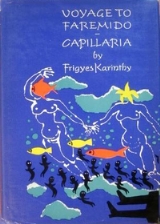
Capillaria
Encyclopedia
Hungarian author Frigyes Karinthy
's fantastic novel
Capillaria (Hungarian: Capillária, 1921), which depicts an undersea world inhabited exclusively by women, recounts, in a satirical vein reminiscent of the style of Jonathan Swift
(author of Gulliver's Travels), the first time that men and women experience sex with one another.
Expressing a pessimistic, perhaps misogynistic, view of women, the novel suggests that, with disastrous effect, women, who are emotional and illogical, dominate men, the creative, rational force within humanity, who represent the builders of civilization.
The males, known as bullpops, are of small stature. They spend their time building and rebuilding tall, complex, rather phallic, towers that the gigantic women destroy as quickly as these structures are erected. Meanwhile, the females engage in sexual adventures, surviving by eating the brains of the miniature men, who have become little more than personified male genitals.
The undersea kingdom is mentioned in the comic book version of The League of Extraordinary Gentlemen
.
, is the sequel to Karinthy's 1916 novel, Voyage to Faremido
,
in which he is transported from the battlefields of World War I
to Faremido. There he encounters men of steel with musical voices and brains composed of a "mixture of quicksilver and minerals."
A readily available summary of the relatively rare novel's plot is provided in The Dictionary of Imaginary Places.
Voyage to Faremido and its sequel, Capillaria, are presented by the author as the fifth and sixth journeys of Gulliver
.
Capillaria is a distinct novel, with a different topic. Science, nature etc. are not discussed (or mentioned only slightly), the novel's main topic is the coexistence of men and women. Also the genre of the two novels are different: Voyage to Faremido is an example of utopian-satyrical literature, but Capillaria is not utopian.
Frigyes Karinthy
Frigyes Karinthy was a Hungarian author, playwright, poet, journalist, and translator. He was the first proponent of the six degrees of separation concept, in his 1929 short story, Chains . Karinthy remains one of the most popular Hungarian writers...
's fantastic novel
Fantastic
The Fantastic is a literary term that describes a quality of other literary genres, and, in some cases, is used as a genre in and of itself, although in this case it is often conflated with the Supernatural. The term was originated in the structuralist theory of critic Tzvetan Todorov in his work...
Capillaria (Hungarian: Capillária, 1921), which depicts an undersea world inhabited exclusively by women, recounts, in a satirical vein reminiscent of the style of Jonathan Swift
Jonathan Swift
Jonathan Swift was an Irish satirist, essayist, political pamphleteer , poet and cleric who became Dean of St...
(author of Gulliver's Travels), the first time that men and women experience sex with one another.
Expressing a pessimistic, perhaps misogynistic, view of women, the novel suggests that, with disastrous effect, women, who are emotional and illogical, dominate men, the creative, rational force within humanity, who represent the builders of civilization.
The males, known as bullpops, are of small stature. They spend their time building and rebuilding tall, complex, rather phallic, towers that the gigantic women destroy as quickly as these structures are erected. Meanwhile, the females engage in sexual adventures, surviving by eating the brains of the miniature men, who have become little more than personified male genitals.
The undersea kingdom is mentioned in the comic book version of The League of Extraordinary Gentlemen
The League of Extraordinary Gentlemen
The League of Extraordinary Gentlemen is a comic book series written by Alan Moore and illustrated by Kevin O'Neill, publication of which began in 1999. The series spans two six-issue limited series and a graphic novel from the America's Best Comics imprint of Wildstorm/DC, and a third miniseries...
.
Related works
Capillaria, which purports to be the sixth voyage of Swift's Lemuel GulliverLemuel Gulliver
Lemuel Gulliver is the protagonist and narrator of Gulliver's Travels, a novel written by Jonathan Swift, first published in 1726.-In Gulliver's Travels:...
, is the sequel to Karinthy's 1916 novel, Voyage to Faremido
Voyage to Faremido
Voyage to Faremido is a fantastic novel by Frigyes Karinthy. It presents beings who not only understand the secrets of nature, but they are the secret of nature themselves — they are nature personified.- Content :...
,
in which he is transported from the battlefields of World War I
World War I
World War I , which was predominantly called the World War or the Great War from its occurrence until 1939, and the First World War or World War I thereafter, was a major war centred in Europe that began on 28 July 1914 and lasted until 11 November 1918...
to Faremido. There he encounters men of steel with musical voices and brains composed of a "mixture of quicksilver and minerals."
A readily available summary of the relatively rare novel's plot is provided in The Dictionary of Imaginary Places.
Voyage to Faremido and its sequel, Capillaria, are presented by the author as the fifth and sixth journeys of Gulliver
Gulliver's Travels
Travels into Several Remote Nations of the World, in Four Parts. By Lemuel Gulliver, First a Surgeon, and then a Captain of Several Ships, better known simply as Gulliver's Travels , is a novel by Anglo-Irish writer and clergyman Jonathan Swift that is both a satire on human nature and a parody of...
.
Capillaria is a distinct novel, with a different topic. Science, nature etc. are not discussed (or mentioned only slightly), the novel's main topic is the coexistence of men and women. Also the genre of the two novels are different: Voyage to Faremido is an example of utopian-satyrical literature, but Capillaria is not utopian.
External links
- http://www.frankfurt.matav.hu/angol/irok/karinthy/public.htm
- http://mek.oszk.hu/02000/02042/html/46.html
- http://www.hungarianbookfoundation.hu/Html/Hunagrian_authors.htm

